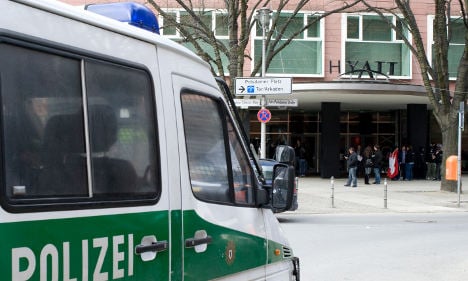Investigators also refused to reveal just how much cash the four masked, machete-wielding suspects made off with from the luxury Grand Hyatt hotel, which was hosting the European Poker Tour on Saturday afternoon.
Meanwhile organisers said the suspects were on the run with about €242,000, down from initial reports of €800,000. The money is said to be part of the €5,000 tournament buy-ins from competitors.
On Monday the head of Germany’s police union Rainer Wendt told broadcaster NTV that the perpetrators were amateurs.
“The way they were armed and behaved, as well as the mountain of evidence they left behind already indicates that the police will quickly identify them,” he added.
He said the gang had plumbed “new depths of stupidity to carry out such a aid in front of running surveillance cameras.”
In what was described by Berlin-based daily Der Tagesspiegel as “the most spectacular heist for years,” the four-person gang, armed with handguns and machetes, burst into the hotel, threatening security staff and sparking a panic.
Images of the chaotic scenes during the raid were broadcast by the N24 television station, showing furniture overturned and poker players hiding under tables and trying to escape.
Amid the chaos, one of the security guards managed to tear a bag full of cash from the robbers. Seven people sustained minor injuries in the crush.
Interviewed in Der Tagesspiegel, the guard said, “I just wanted to protect the money. You don’t think of anything in that situation, just your duty.”
Witnesses said the whole incident lasted less than 10 minutes and the gang fled out into the streets around Potsdamer Platz, one of Berlin’s busiest squares.
A statement on the tournament website called on anyone with photo or video footage of the robbery to hand it over to police.
The competition started on Tuesday with nearly 1,000 players, including German tennis legend Boris Becker.



 Please whitelist us to continue reading.
Please whitelist us to continue reading.
Member comments